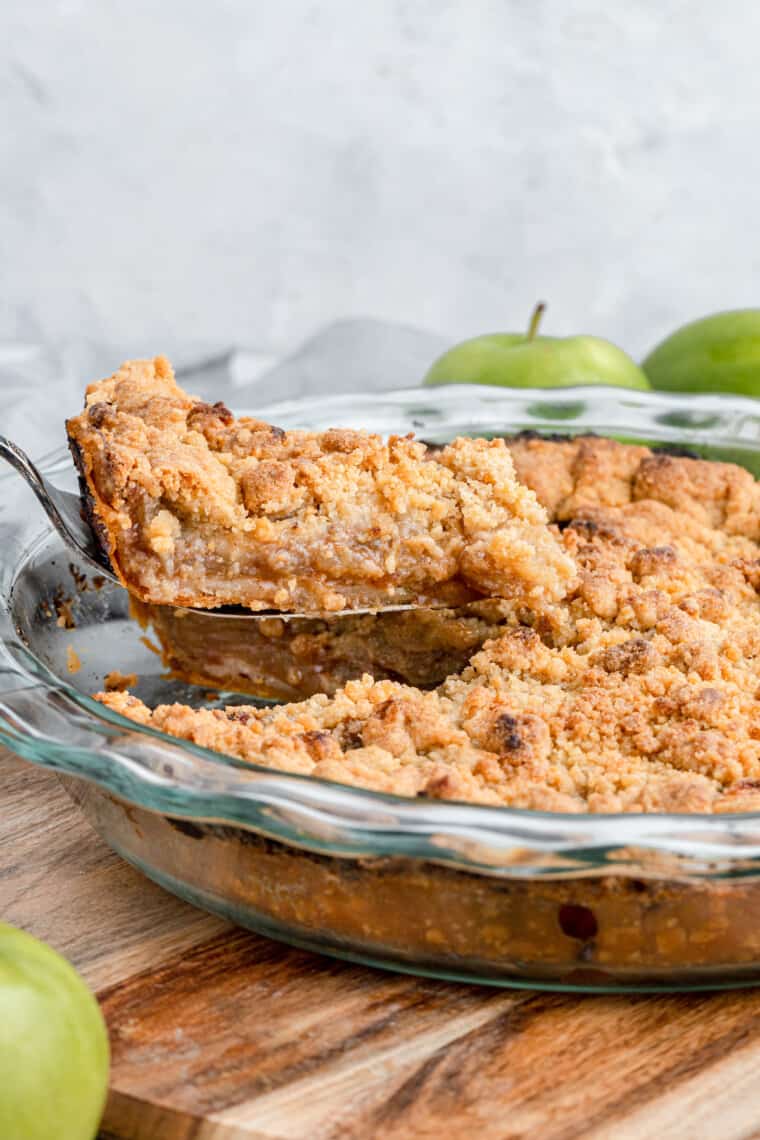


Here are some of the best reasons to go gluten-free, as well as reasons to not go gluten-free. Use this guide as a resource if you’re considering making a change to your diet.
I made the transition to gluten-free eating several years ago. It was a major shift for me, and I didn’t take the decision lightly. Because I learned so much about why and why not to go gluten-free during that time, I wanted to share some of that insight with you.
Please note that I am not a medical professional The information in this guide to answer the question “why go gluten-free” is based on my own research and personal experience. Please always talk to a doctor first if you’re considering going gluten-free or adopting any new diet.

If you’re interested in my personal experience going gluten-free, you may like this Facebook Live all about my journey. Here’s a quick summary of how I decided it was time to go gluten-free:
I used to have no issues with food. But, as I got older, I started having stomach aches. On a trip to Italy, I would wake up in pain after a late pasta dinner, but I didn’t think much of it.
After my first son was born, I couldn’t take it anymore. I went to a gastroenterologist, who found that my gliadin antibodies were off the charts. However, much to my doctor’s surprise, my biopsy was negative for celiac disease. She recommended that I eat less gluten to reduce my immune response, but said I didn’t need to go completely gluten-free. So that’s how I lived for several years. And I felt OK. Just OK.
Next, I also had some fertility problems. After a couple of rounds of Clomid, I got pregnant with my first son. But that wasn’t happening the second time around. After several cycles, we took a break. I was feeling generally crappy so I decided to cut out gluten completely. After our “summer break”, I went back to the reproductive endocrinologist to figure out our next steps, and guess what? I was pregnant!
During my pregnancy and for a while after, I stayed on the “gluten light” diet. But I really never felt great, so in 2014 I decided to go completely gluten-free (I never gave up the pasta dinners, they’ve just turned into gluten-free Italian Noodle Casserole). Ever since I’ve felt so much better. Of course, it’s not always perfect. Overall, though, going gluten-free has been life-changing for me, even though I do not have celiac disease.

Before we get to the reasons TO go gluten-free, let’s cover some common misconceptions and reasons you should not give up gluten.
First, if you’re concerned that you have celiac or another condition, it’s important to NOT immediately cut gluten out of your diet. This sounds backward, but if you stop eating gluten, you can affect the results of any diagnostic tests. If there’s no gluten in your system, your celiac test cannot show up positive, even if you have the disease.
So the first step is to see your doctor and get tested.
If you’re considering going gluten-free for a non-medical reason, you may want to reconsider. A gluten-free diet isn’t likely to help with weight loss, “detoxing”, or better health if you don’t have a sensitivity to it.
You may have heard that going gluten-free can reduce abdominal discomfort, brain fog, or inflammation. But those improvements are usually felt by people who have a gluten intolerance. They start to heal their gut by removing the allergen.
It’s true that highly-processed, gluten-containing foods like white bread, cakes, and cookies may not be the healthiest options. But whole-grain bread and grains in moderation can be quite healthy.
It’s also important to note that going gluten-free can reduce your fiber and nutrient intake. Many whole-grain products are enriched with essential vitamins. In fact, if you’re not careful with the gluten-free products you choose, you may end up eating more sugar, fat, and other starches hiding in highly-processed gluten-free foods.
If you’ve talked with your doctor and had the tests (usually blood tests, an endoscopy, and/or biopsy), you may have a good reason to go glutenfree, including one of these considerations:
Celiac disease is an autoimmune condition. Eating gluten causes damage to the small intestine. It affects roughly 1% of people. People with celiac disease have a genetic predisposition to it. Eating even a tiny amount of gluten can trigger damage to the cilia that line the small intestine. As a result, the intestines cannot readily absorb nutrients from food.
In the short term, celiac disease symptoms include:
The long0term effects of untreated celiac can cause major health problems. Over time, if your body is not absorbing the nutrients it needs, people with celiac may experience:
There is also an increased risk for other physical and mental health issues, including:
The only way to treat celiac disease is to follow a strict gluten-free diet.
Dermatitis Herpetiformis is an itchy skin rash that looks like bumps or blisters. It typically appears near the elbows, knees, buttocks, and along the hairline. Eating gluten can cause a rash, especially in people with celiac disease. However, people with a negative test for celiac can still react with a rash, and it’s a sign to avoid gluten.
There are medications for the itching. But the only way to control future outbreaks is by following a gluten-free diet.
Some people do not have celiac but have a gluten sensitivity or gluten intolerance. They may have symptoms but there is no intestinal damage.
Symptoms of gluten sensitivity include:
A sensitivity can be difficult to diagnose. Usually, it is done through elimination. So if you suspect that you have a gluten intolerance, the best thing to do is to continue eating gluten and have the full set of diagnostic tests to rule out another condition before starting a gluten-free diet.
A wheat allergy is different from celiac disease or gluten intolerance. If you have a wheat allergy, you have a negative reaction to any protein in wheat, not just gluten. When you eat wheat, your immune system reacts like it’s fighting off a disease. It releases antibodies that can cause itching, swelling, difficulty breathing, headaches, congestion, cramps, diarrhea, nausea, constipation, and, in some cases, anaphylaxis.
To test for a wheat allergy, you’ll need skin and blood tests, as well as a food challenge test. To avoid symptoms, people with wheat allergies must avoid all wheat products. And in the case of an attack, antihistamines or epinephrine can prevent a severe reaction.
Gluten ataxia is another autoimmune disorder. It causes difficulty digesting gluten. In this case, however, the antibodies your body releases attack the brain and central nervous system. This can lead to problems with movement, balance, coordination, fine motor skills, and even speech and vision. Usually, there are no digestive symptoms.
Gluten ataxia is still a fairly newly discovered condition. The only treatment is a gluten-free diet.
People who have one autoimmune condition are more than likely to have another. so if you have a non-celiac autoimmune disorder, you should discuss the risks and benefits of going gluten-free with your doctor beforehand.
Some studies indicate that gluten can increase inflammation and negatively impact your gut biome. However, there is no clear evidence that a gluten-free diet can improve other autoimmune or thyroid disorders. But given the increased chance of developing a second autoimmune disease, there may be benefits to going gluten-free. Your doctor can best advise you on this.
Some people go gluten-free to treat gastrointestinal distress, fatigue or muscle pain, depression, anxiety, brain fog, infertility, or weight gain or loss.
Unless you have one of the conditions above, there is no clear evidence that a gluten-free diet will help with these symptoms. That is why it’s critical to work with your doctor. She can help determine the exact cause of your symptoms before you remove gluten from your diet.

If you have one of the diagnosable conditions above like celiac disease or gluten ataxia, you should certainly go gluten-free. Likewise, if you have a sensitivity or allergy, you may feel better after removing gluten from your diet.
I repeat: always talk to your doctor first!
Removing gluten before testing can affect the accuracy of the results. And without proper guidance, you may be at risk for nutritional deficiencies.
Lastly, I want to mention that going gluten-free can come with some downsides. It can be expensive and potentially socially isolating. You will have to advocate for yourself and make your dietary needs clear to family, friends and anyone serving you food.
So while it is medically necessary for some people to go gluten-free, have an open discussion with your doctor and get a proper medical diagnosis before diving into a gluten-free lifestyle.
Bottom line: Going gluten free is not a fad and should not be taken lightly. Please consider all aspects of your physical and mental health. And respect people who do go gluten-free for any reason.
The good news is that whether you go gluten-free or not, there are so many delicious ways to enjoy gluten-free meals. Check out my recipe archive for new inspiration, including these favorites:




Welcome to Cupcakes & Kale Chips, where I share gluten free recipes & kid-tested family favorites!

Thank you for this very interesting and thought provoking article.